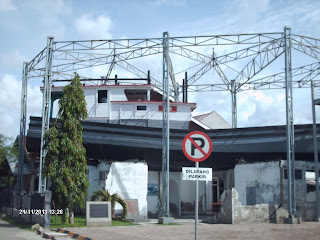My paternal grandfather passed away 30 years ago in Vancouver, a few weeks short of his 72nd birthday, and was buried in Vancouver a week later as per his instructions. He was born into a wealthy family in northern China in 1912. He was well educated and led a privileged life until 1949 when the communists took over the rule of China. He managed to escape to Hong Kong with his teenage son (my father). He never returned to Mainland China after taking refuge in Hong Kong. When he visited Vancouver for holidays, he fell in love with the place right away. He decided to stay and bought a vegetable farm in the suburbs. He made every effort to assimilate into the mainstream culture. Even though he only lived in Vancouver for 13 years, he always considered Canada as his final home.
My maternal great aunt was the direct opposite of my grandfather. At age 17, she was forced to marry an older man in her village in Southern China. She ran away to the nearest port and hid in a cargo ship heading for Singapore. She worked as a domestic servant or nanny all her life since she was illiterate and never married. When I visited her in Singapore in 1985, she had already lived in Singapore for 51 years. She lived very frugally and sent all her earnings back to her relatives in China. After she passed away, her adopted daughter brought her ashes back to a temple near her hometown in southern China. My great aunt had a lot of deep-rooted ties with Singapore where she had lived for 62 years; however, her heart and soul never left China.
In my travels, locals often ask me where I am from. I used to say that I am from Canada. For remote areas, people simply could not accept the answer of an outwardly Chinese looking visitor coming from Canada. For urban dwellers, the answer usually suffices when I say “Vancouver, Canada”. Then they would reply, “My uncle lives in Toronto…” I am very grateful to have the best of both worlds. My Chinese heritage makes me pragmatic, resourceful and organised. My Canadian upbringing makes me compassionate, open and trusting. Moreover, unlike my grandfather and great aunt, I would not insist to be buried in Canada or China for I am a citizen of the world.
As air travel becomes more and more prolific, people move around more frequently and widely. Not just the rich and famous would have homes all over the globe. I often hear Canadian seniors telling me that they “rotate” around the world to stay with their grown-up children all over the world. National boundaries are fading. Inter-racial marriages are common in developed countries. It would be almost impossible to classify ethnicities in a hundred years or so. We might not be far away from the benchmark of living in a truly global village.
My maternal great aunt was the direct opposite of my grandfather. At age 17, she was forced to marry an older man in her village in Southern China. She ran away to the nearest port and hid in a cargo ship heading for Singapore. She worked as a domestic servant or nanny all her life since she was illiterate and never married. When I visited her in Singapore in 1985, she had already lived in Singapore for 51 years. She lived very frugally and sent all her earnings back to her relatives in China. After she passed away, her adopted daughter brought her ashes back to a temple near her hometown in southern China. My great aunt had a lot of deep-rooted ties with Singapore where she had lived for 62 years; however, her heart and soul never left China.
In my travels, locals often ask me where I am from. I used to say that I am from Canada. For remote areas, people simply could not accept the answer of an outwardly Chinese looking visitor coming from Canada. For urban dwellers, the answer usually suffices when I say “Vancouver, Canada”. Then they would reply, “My uncle lives in Toronto…” I am very grateful to have the best of both worlds. My Chinese heritage makes me pragmatic, resourceful and organised. My Canadian upbringing makes me compassionate, open and trusting. Moreover, unlike my grandfather and great aunt, I would not insist to be buried in Canada or China for I am a citizen of the world.
As air travel becomes more and more prolific, people move around more frequently and widely. Not just the rich and famous would have homes all over the globe. I often hear Canadian seniors telling me that they “rotate” around the world to stay with their grown-up children all over the world. National boundaries are fading. Inter-racial marriages are common in developed countries. It would be almost impossible to classify ethnicities in a hundred years or so. We might not be far away from the benchmark of living in a truly global village.









